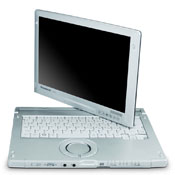
Panasonic Toughbook C1
Arming mobile clinicians with full-powered laptops and wireless Internet access could save big money by preventing hospital admissions, unnecessary referrals to specialists and even wasted home visits, a new study from the UK suggests.
In an eight-week trial at 11 sites across England in the summer of 2010, semi-ruggedized Panasonic Toughbook laptops saved an average of £462 ($737) per clinician, which extrapolates to £3,002 annually, or nearly $4,800, according to the National Health Service's National Mobile Health Worker Project report (PDF).
While results varied widely across the sites, most participants showed productivity increases after they got the Toughbooks. Clinicians also spent more time with patients. "Clinicians across the eleven pilot sites estimated that the devices allowed them to save 507 referrals, equating to a saving of nearly 9 percent across the pilot period. Clinicians across the eleven pilot sites estimated that the devices allowed them to avoid 49 admissions, equating to a saving of approximately 21 percent across the pilot period," the report says.
"Mobile devices are key to ensuring that community services don't get left behind as the NHS undergoes changes in the way care is commissioned and provided. Mobile devices will bridge the information gap that currently exists around community care, making the forthcoming Community Information Data Set (CIDS) far easier for organizations to collect," the report explains.
The average cost of a home visit was £42 ($67) during the study period, so each referral avoided and each "no-access" visit—where the clinician couldn't gain access to the patient, for various reasons—saved at least that much money. According to the report, having the laptops could avoid wasteful no-access visits by providing phone numbers, the location of hidden keys or entry codes.
The report also found that each hospital admission prevented saved £1,735 ($2,766), including the cost of transport and ED assessment.
Each Toughbook was loaded with a suite of software known as the "gold build," including Microsoft Office, a Cisco VPN client, Citrix components for remote access to applications and various security and identity-management applications. In addition to the "gold build," the National Mobile Health Worker Project added AcceleNet software to boost wireless performance, the EMIS Web ambulatory electronic medical record and a few other enhancements, including smart-card readers.
Participating organizations were encouraged to customize the laptops, since the technology is far from perfect. "Frustrations with connectivity and session persistence are the major barriers to smooth adoption of mobile devices. Projects must be willing to experiment with different network providers to find the best levels of coverage for users, and to centrally coordinate the development of robust connections," the report says.
"In addition to improving the connectivity capability of devices, the applications that run on them must be developed further to support mobile services through use of approaches such as store and forward. Such approaches would allow clinicians to work continuously and seamlessly even during periods of time when they are out of range of network signal, with data being temporarily held locally and securely on the device and uploaded to central servers when an Internet connection becomes available."
The study also says that NHS clinicians will embrace innovation and find unexpected ways to make technology work for them as long as they have adequate organizational support and a sense of ownership in a project. "Mobile deployment is not just about the technology. Finding the right equipment is only the start of the process; engaging and supporting the users is critical to ensuring success and full benefits realization for mobile projects," the study says.
Research is continuing, and the NHS has promised a follow-up report next year.


















